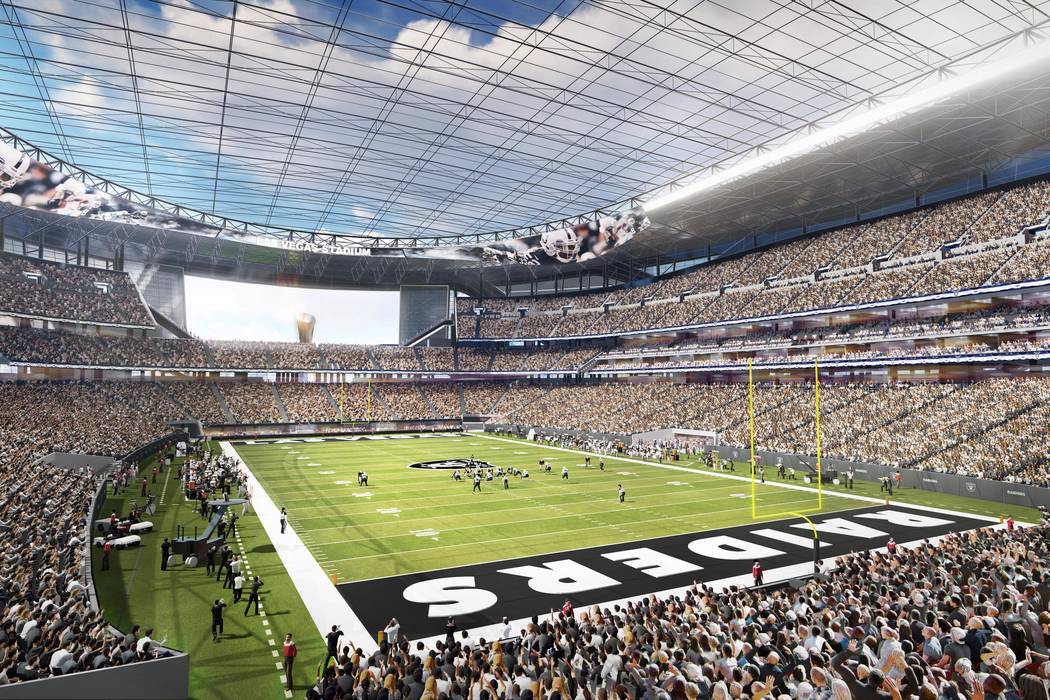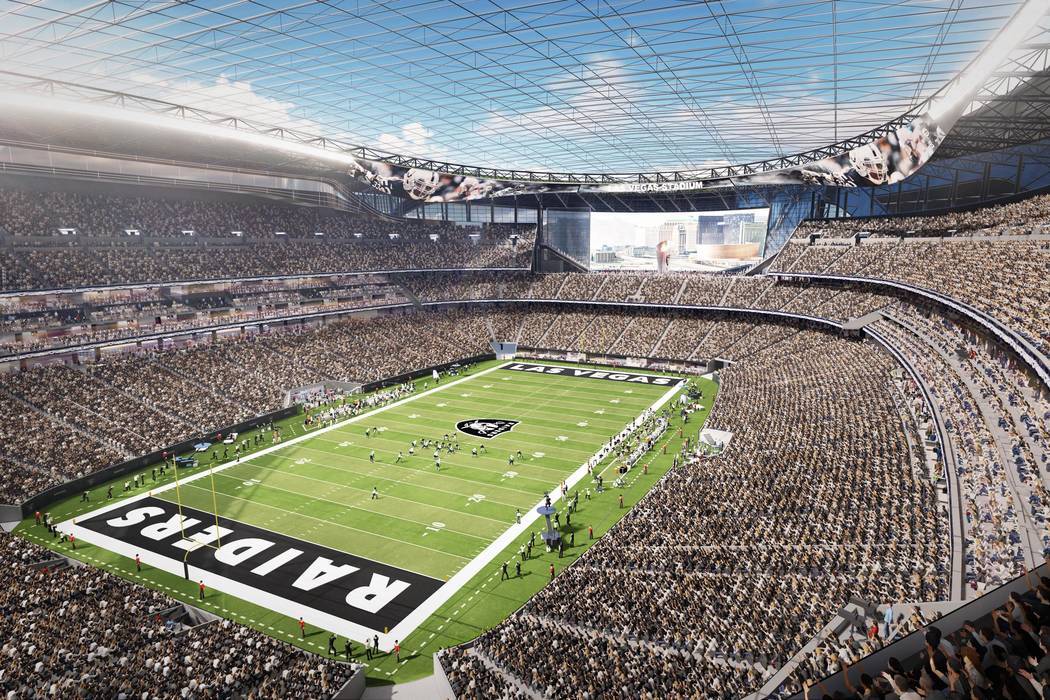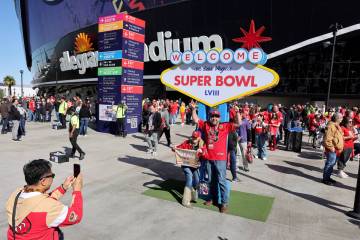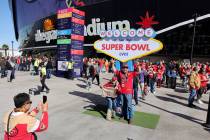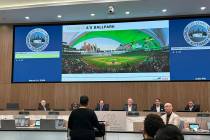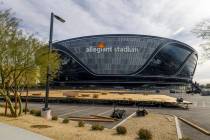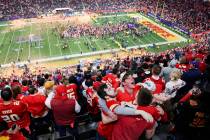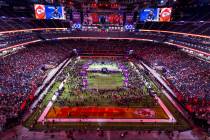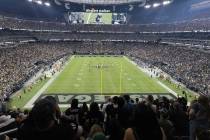Las Vegas seen as NFL draft site by 2019, Super Bowl in 2024-25
The Oakland Raiders received an important approval that will assure the staging of a Monday groundbreaking event for the 65,000-seat, $1.9 billion domed football stadium and the team’s president told the Las Vegas Stadium Authority Thursday that Las Vegas could host an NFL draft as early as 2019 and a Super Bowl by 2024 or 2025.
Marc Badain also said he and Stadium Authority Chairman Steve Hill would be flying to Houston on Tuesday for the second round of bidding to host one or more FIFA World Cup soccer matches in 2026.
“We’ve had productive dialogue with the NFL, we had meetings a few weeks ago, and they laid out the process for the NFL draft as well as future Super Bowls,” Badain said in a stadium update at the board meeting.
“And I’ll just tell you that we had very positive feedback for the draft to be awarded for 2019 and 2020 and we have a meeting in about three weeks in Dallas to make a presentation for Las Vegas to be the host for one of those drafts and the Super Bowl for the year 2024 or 2025.”
The NFL commonly approves Super Bowl games to cities that have built new stadiums for their NFL teams.
Super Bowl cities
Over the next four years, games will be at U.S. Bank Stadium in Minneapolis, home of the Minnesota Vikings, in 2018; Mercedes Benz Stadium, home of the Falcons in Atlanta in 2019; Hard Rock Stadium, home of the Dolphins in Miami Gardens, Florida, in 2020; and the as yet unnamed stadium being built for the Los Angeles Rams and Los Angeles Chargers in Inglewood, California, in 2021.
Later in the meeting, the board unanimously approved an enabling work agreement that will assure the Raiders’ contracted stadium builders to be able work on 62 acres at Interstate 15 and Russell Road, including permission to undertake a groundbreaking event. The board also unanimously approved a professional services contract with Las Vegas-based Grand Canyon Development Partners to oversee compliance to the work agreement, in place until final development agreements with a guaranteed maximum price is signed.
A description of the enabling work in the contract specifically lists groundbreaking as one of the permitted uses. The Grand Canyon Development Partners contract has hourly rates with a total not to exceed $50,000 through April 30. The Stadium Authority is hopeful of having final development agreements in place by February.
Community benefits plan
One area the Raiders and the authority fell short on Thursday was completing a review of the long-debated community benefits plan, a document that spells out the Raiders and their contractors’ commitment to hiring and subcontracting with small businesses and minority groups and participating in charitable and civic endeavors.
While the Raiders and the authority made headway on several terms within the 10-page plan, they failed to agree on setting a specific percentage of minority contracts and laborers.
The law signed by Gov. Brian Sandoval in October 2016 assuring $750 million in public financing for the stadium project specifically calls for at least 15 percent of the aggregate value of construction work in the guaranteed maximum price be contracted to vetted local small business enterprises.
The plan would be overseen by an uncompensated seven-member panel with one representative from the authority, one appointee each from the governor, the State Senate majority leader and the State Assembly speaker and three appointed by the Raiders.
While the plan specifies that the Raiders and their contractors will reach out to the Latin Chamber of Commerce, the National Association of Minority Contractors, the Women Business Enterprise Council, the Nevada Contractors Association, the Western Region Minority Supplier Development Council, the Asian Chamber of Commerce, the Urban Chamber and the Gay and Lesbian Chamber of Commerce Nevada, there are no percentage breakdowns.
Best plan drafted
While Raiders legal counsel Dan Ventrelle called the plan the best ever drafted for a stadium construction project, other authority members wanted greater assurance.
Under a section on workplace diversity, the plan says the “developer has created initiatives that have led to and will continue to lead to opportunities for women, people of color and other targeted groups.” The plan commits to working with veterans, faith-based leaders, apprenticeship training, work-readiness support, union partnership and the LGBTQ community.
The Raiders contract with prime contractor Mortenson Construction of Minneapolis and McCarthy Builders of Henderson requires a workforce participation target of not less than 38 percent of construction work hours performed by minority and female workers. Critics said a “target” goal doesn’t assure that the numbers would be there.
The plan also calls for a workforce participation target of not less than a combined 55 percent of work hours on days in which events take place at the stadium. Some critics said they would prefer the mandate be applied to all permanent stadium maintenance employees, not just those working events.
Hill said he expects negotiators to continue to work on the plan and return at the authority’s Dec. 14 meeting.
Tax-reform legislation
Hill also addressed last week’s surprising insertion of wording in the House Republicans’ tax-reform legislation that would eliminate tax-exempt status for bonds used to pay for stadiums used by professional sports teams.
Hill said an analysis by Jeremy Aguero of Applied Analysis, the authority’s contracted staff, and him indicated the removal of the tax exemption could cost the authority an estimated $3 million a year, the approximate difference of the interest spread between taxed and tax-exempt bonds.
Hill said the Southern Nevada Tourism Infrastructure Committee he chaired that delivered the stadium financial formula for the bill that created the $750 million in public financing for the stadium estimated conservatively and that the tax revenue generated by the 0.88 percentage-point increase in the room tax would be more than enough to cover the additional cost, but it would mean less money available for authority expenses.
Asked if he was worried about losing that revenue, Hill said, “Well, (losing) $3 million is a concern. It’s an additional obstacle.
“We’re going to have to figure out how to deal with it if, in fact, it is implemented,” he said. “We’re going to have obstacles come up and moving forward, we’ll figure it out. The community would lose $3 million a year and that’s not helpful.”
Sen. Dean Heller, R-Nev., said Wednesday that he would work toward enabling the Las Vegas stadium to have an exemption from the bill since planning and financing was underway before the tax-reform legislation was proposed.
Contact Richard N. Velotta at rvelotta@reviewjournal.com or 702-477-3893. Follow @RickVelotta on Twitter.
Another date for the calendar
With several issues still outstanding, including a UNLV joint-use agreement on the stadium that wasn't even discussed Thursday, the Raiders and the Las Vegas Stadium Authority are going to need an extra meeting to get everything done by February.
Under the current schedule, the authority board is scheduled to meet Dec. 14, Jan. 11 and Feb. 8.
With the authority closing in on the home stretch for final approval by February, Authority Chairman Steve Hill told members to add Thursday, Jan. 25 to their list of meetings.



